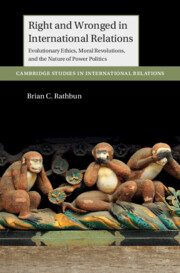 Right and Wronged in International Relations
Right and Wronged in International Relations Book contents
- Right and Wronged in International Relations
- Reviews
- Cambridge Studies in International Relations: 163
- Right and Wronged in International Relations
- Copyright page
- Dedication
- Contents
- Figures
- Tables
- Acknowledgments
- 1 The Nature in and Nature of International Relations
- 2 Lesser Angels
- 3 Mankind Is What Anarchy Makes of It
- 4 See No Evil, Speak No Evil?
- 5 To Provide and to Protect
- 6 Just Desserts in the Desert
- 7 Barking Dogs and Beating Drums
- 8 Biting the Bullet
- 9 Dying in Vain
- 10 Daily Bread
- 11 From Demonizing to Dehumanizing
- Index
- Cambridge Studies in International Relations: 163
9 - Dying in Vain
Authoritarian Morality Causes the German Empire to Collapse
Published online by Cambridge University Press: 29 July 2023
- Right and Wronged in International Relations
- Reviews
- Cambridge Studies in International Relations: 163
- Right and Wronged in International Relations
- Copyright page
- Dedication
- Contents
- Figures
- Tables
- Acknowledgments
- 1 The Nature in and Nature of International Relations
- 2 Lesser Angels
- 3 Mankind Is What Anarchy Makes of It
- 4 See No Evil, Speak No Evil?
- 5 To Provide and to Protect
- 6 Just Desserts in the Desert
- 7 Barking Dogs and Beating Drums
- 8 Biting the Bullet
- 9 Dying in Vain
- 10 Daily Bread
- 11 From Demonizing to Dehumanizing
- Index
- Cambridge Studies in International Relations: 163
Summary
Binding morality is responsible for the collapse of Germany at the end of World War I. Rationalist account maintains that self-serving elites, even while losing, might inflate their war aims precisely as the battlefield and home front situation are turning against them in an effort to buy off the ordinary public for their sacrifices. This chapter shows instead that as the war dragged on and Germany’s troubles accumulated, the German military, a bulwark of binding morality, raised its wartime aspirations so as to justify the costs of the conflict, adequately compensating the country for the loyal sacrifices of its soldiers. This irrationality is best seen in relief, by comparing the nationalist right not only to the German left but also to the consequentialist and realist ethics of the German Chancellor, Bethmann-Hollweg, who was eventually swept aside by conservative forces precisely for being willing to concede to reality. A survey panel experiment, conducted on a sample of the Russian public, induces the same inflation dynamics. Those who identify as binding moralists persist for much longer in a theoretical war. Those who stay in the conflict until the very end increase their reservation price over time, even as the Russians are suffering disproportional casualties.
- Type
- Chapter
- Information
- Right and Wronged in International RelationsEvolutionary Ethics, Moral Revolutions, and the Nature of Power Politics, pp. 271 - 295Publisher: Cambridge University PressPrint publication year: 2023


